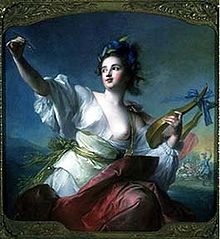Though I meant to post this last weekend, life got in the way. Regardless, there’s no such thing as ‘too late’ in my book so I’ll share with you now. As some of you know, I’ve launched my A-musing the World Blog Event this past week and no doubt you’ve gathered I’m not only a huge fan of the nine muses of inspiration, but as a writer, I’m a die hard believer in these lovely goddesses. I suppose, in their own way within modern Christian religion they would be considered…angels of a sort? Nonetheless, they originally belonged to Greece and are essential to us all.
So, let me introduce you to the nine muses of inspiration birthed of Greek Mythology. Alive and well in spirit. Alive and well more so at this blog for the next few months. Before I go any further, I’d like to introduce each muse and perhaps refresh your memory. While there's much debate about the order in which they came into existence, the muse I covered this past week (Calliope) was most certainly first. After that, I will list them as they will appear as they visit this blog. Therefore….read on to once again become reacquainted with those who watch over you…inspire you…
Calliope ~ Muse of Epic Poetry.
One account says Calliope was the lover of the war god Ares, and bore him several sons: Mygdon, Edonus, Biston, and Odomantus - respectively the founders of Thracian tribes known as the Mygdones, Edones, Bistones and Odamantes. Calliope also had two famous sons, Orpheus and Linus. By either Apollo or the king Oeagrus of Thrace. She taught Orpheus verses for singing. She was the wisest of the muses, as well as the most assertive. She married Oeagrus close to Pimpleia, Olympus. Calliope is always seen with a writing tablet in her hand. At times, she is depicted as carrying a roll of paper or a book or as wearing a gold crown.
Melpomene ~ Muse of Tragedy
She is often represented with a tragic mask and wearing the cothurnus, boots traditionally worn by tragic actors. Often, she also holds a knife or club in one hand and the tragic mask in the other. On her head she is shown wearing a crown of cypress. Melpomene is the daughter of Zeus and Mnemosyne. In Roman and Greek poetry, it was traditional to invoke the goddess Melpomene so that one might create beautiful lyrical phrases
Euterpe ~ Muse of Music
Called the "Giver of delight", when later poets assigned roles to each of the Muses, she was the muse of music. In late Classical times she was named muse of lyric poetry and depicted holding a flute. A few say she invented the aulos or double-flute, though most mythographers credit Marsyas with its invention. The river god Strymon impregnated Euterpe; her son Rhesus led a band of Thracians and was killed by Diomedes at Troy, according to Homer's lliad.
Erato ~ Muse of Lyric Poetry
In the Orphic hymn to the Muses, it is Erato who charms the sight. Since the Renaissance she is often shown with a wreath of myrtle and roses, holding a lyre, or a small kithara, a musical instrument that Apollo or she herself invented. In Simon Vouet's representations, two turtle-doves are eating seeds at her feet. Other representations may show her holding a golden arrow, reminding one of the "eros", the feeling that she inspires in everybody, and at times she is accompanied by the god Eros, holding a torch.
Urania ~ Muse of Astonomy
Some accounts list her as the mother of the musician Linus. She is usually depicted as having a globe in her left hand. She is able to foretell the future by the arrangement of the stars. She is often associated with Universal Love and the Holy Spirit. She is dressed in a cloak embroidered with stars and keeps her eyes and attention focused on the Heavens. Those who are most concerned with philosophy and the heavens are dearest to her.
Terpsichore ~ Muse of Dance
She lends her name to the word "terpichorean" which means "of or relating to dance". She is usually depicted sitting down, holding a lyre, accompanying the dancers' choirs with her music. She is sometimes said to be the mother of the Sirens by Achelous. Her name comes from the Greek words τέρπω ("delight") and χoρός ("dance").
Clio ~ Muse of History
 She had one son, Hyacinth, with the King of Pieria, Pierus. Some sources say she was also the mother of Hymenaios. She is often represented with a parchment scroll or a set of tablets and is also known as the Proclaimer. The name is from the root κλέω/κλείω, meaning "recount" or "make famous".
She had one son, Hyacinth, with the King of Pieria, Pierus. Some sources say she was also the mother of Hymenaios. She is often represented with a parchment scroll or a set of tablets and is also known as the Proclaimer. The name is from the root κλέω/κλείω, meaning "recount" or "make famous".Thalia ~ Muse of Comedy
Thalia (in ancient Greek Θάλεια / Tháleia or Θάλια / Thália, "the joyous, the flourishing", from θάλλειν / thállein, to flourish, to be verdant) was the muse who presided over comedy and idyllic poetry. In this context, her name means “flourishing,” because the praises in her songs flourish through time. According to pseudo-Apollodorus, she and Apollo were the parents of the Corybantes. Other ancient sources, however, gave the Corybantes different parents. She was portrayed as a young woman with a joyous air, crowned with ivy, wearing boots and holding a comic mask in her hand. Many of her statues also hold a bugle, a trumpet (both used to support the actors' voices in ancient comedy), a shepard’s staff, or a wreath of ivy.
Polyhymnia ~ Muse of Glorious Praise
She is depicted as very serious, pensive and meditative, and often holding a finger to her mouth, dressed in a long cloak and veil and resting her elbow on a pillar. Polyhymnia is also sometimes accredited as being the Muse of geometry and meditation. In Bibliotheca histrica, Diodorus Siculus wrote, "Polyhymnia, because by her great (polle) praises (humnesis) she brings distinction to writers whose works have won for them immortal fame...".
Are these women (Spirits…Goddesses…however you see them) not beyond spectacular? Though raised Christian, my beliefs have become a mix of those taken not only from Christianity but Celtic Mythology and Pagan (as seen clearly in my stories) as well as Greek mythology. The way I have it figured, all myths spring from a grain of truth. Stories get passed down, generation to generation.
The nine muses of inspiration? As real as Fionn mac Cumhaill, Irish warrior or Gabriel, archangel.
 Ouch! Calliope just hit me upside the head. Reminded me that only she was allowed to ramble. *smiles* Anyways, I think you get the point. I adore the nine muses of inspiration and am so proud to be part of the Song of the Muses Anthology. Interested in following each muses' journey? Then be sure to pop in every week as they visit this blog alongside the author whom wrote of them.
Ouch! Calliope just hit me upside the head. Reminded me that only she was allowed to ramble. *smiles* Anyways, I think you get the point. I adore the nine muses of inspiration and am so proud to be part of the Song of the Muses Anthology. Interested in following each muses' journey? Then be sure to pop in every week as they visit this blog alongside the author whom wrote of them. What’s on tap for this coming week? Me! No, sorry, I meant to say Muse Melpomene. You see, I wrote her tale of love, Highland Muse (under her close supervision of course). After all, the Muse of Tragedy tends to take things somewhat seriously on occasion. Be sure to pop in Monday morning as Melpomene is interviewed by the very gracious (and super humorous) Thalia. Yep, two muses will be tromping around here so swing in and join the fun! What could be more interesting than the Muse of Comedy grilling the Muse of Tragedy? I suppose, in her own way, Melpomene needs a muse like Thalia around, eh?
Cheers to all. Hope you enjoyed this post!
~Sky






























































































4 comments:
Hi Sky,
What a great refresher course. I enjoyed this post and look forward to the coming week. Have a great day.
Carol L.
Lucky4750@aol.com
Guess this is a reminder to read all the stories. I bought them all when they came out...just never read them.
So many stories...so little time.
Glad you enjoyed it, Carol! I too needed a wee bit of a refresher so creating this post was fun. Hope you enjoy the fun ahead!
Hugs
~Sky
I hear ya, Beth. I have so many books set aside to read at this point, it's nuts!
Hugs
Sky
Post a Comment